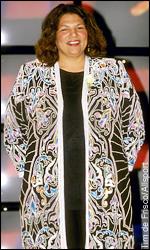



|

|
Tuesday, September 19
DeFrantz would do it all over again
By Wayne Drehs
ESPN.com
Anita DeFrantz remembers the hate mail. And the prank phone calls. And the group that invited her to become a Communist.
But ask her if she would have done anything differently, if she would have shut her mouth and not so vehemently opposed the 1980 Olympic boycott and her immediate answer is no.
"What could I have done differently?" she says. "I was one athlete, down to my last few pennies, who was doing the best I could. It was the right decision. It's important for athletes to have the right to choose and that right was taken away."
DeFrantz' name was splashed in newspapers across the country in 1980, when she led a group of disgruntled athletes in a lawsuit against the U.S. Olympic Committee. After endless research and communication with individuals from Great Britain and Australia (both countries supported the boycott, but allowed the individual teams to decide on competing), she referred to a provision of the Amateur Sports Act of 1978, which specifically barred anyone from denying an athletes right to compete in the Olympics.
"I thought it was a realistic goal at the time," DeFrantz said of winning the suit. "I was right then and I'm right now."
DeFrantz, a member of the U.S. rowing team at the time and the spokesperson for the USOC's Athletes Advisory Council, was essentially suing the group she represented. When she told Don Miller, then the Executive Director of the USOC, that she was suing him, she said the former Colonel was actually supportive.
"It's hard for me to say that because he's passed away, but I truly believe he wanted me to win," DeFrantz said. "Even though he was a Colonel and his opinion would have been in direct defiance of the commander in chief, I believe in his heart he wanted the athletes to go."
|  | | DeFrantz is now the second vice president of the IOC. |
For non-athletes, the anti-government position wasn't a popular one and DeFrantz was seen as the poster child for bucking the boycott. Newspaper columns called out her lack of patriotism, while hate mail piled up in her mailbox and prank phone calls disturbed her nights. One of the strangest encounters she had was with members of a pro-Stalin group who asked DeFrantz to move to Moscow with them to become a communist.
"I was like, 'Uhh, this is all very nice, but the reason I want to go is to compete, to be in the Olympic Games. It has nothing to do with being a certain party member or anything like that.' I wanted the words to be said about me that I was an Olympic champion," she said.
The lawsuit was quickly overturned, with that decision upheld in a federal appeals court. After the second door was slammed, the group decided against appealing further because of, "time and the judgment that it would not be worthwhile." Later, DeFrantz met with a member of President Jimmy Carter's Joint Chiefs of Staff, from whom she wanted one simple question answered: Will one life be saved by our team staying here?
"He sat there, thought for a moment, looked at me, and said, 'No. I can't tell you one life will be saved,'" DeFrantz said.
The answer crushed her, especially considering the effort she gave to competing in 1980. A typical day for DeFrantz was training at sunrise, law school throughout the day, followed by work in night court. She couldn't fund her education through a summer job because that was the season to compete. After law school, she worked in a juvenile law center as an attorney, while serving as a master in a dorm at Princeton.
"I'm so grateful to Princeton because I was a liability to them," DeFrantz said. "With all that was going on and all the attention, I'm sure my phone was tapped, I know it was. But they didn't make me leave. I was barely surviving, I had just enough money to live and eat. And then the government told me I couldn't go to the Olympics. Being a lawyer, I knew my rights."
DeFrantz, now 47, has continued her fight for athletes' rights. She's currently the Second Vice President of the International Olympic Committee and after the Sydney Games, she'll be the first Vice President. Her goal is to be the first female president of the IOC after Juan Antonio Samaranch retires. She is also the president of the Amateur Athletic Foundation of Los Angeles.
"Someday, that would be great," DeFrantz said of being IOC president. "My goal is that athletes never again get used like they were. Nobody wins in this. The politicians don't win, the athletes certainly don't win. I've talked to a lot of people from the USOC over time that have told me they wish they would have made a different decision and voted for the athletes. That says something."
Wayne Drehs is a staff writer for ESPN.com.
|  | |
|







